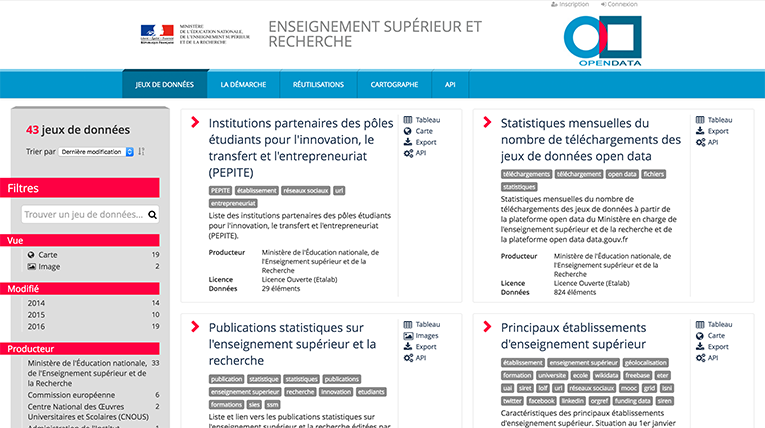The French Ministry of Higher Education and Research releases scanR to foster research and innovation

scanR is a web application developed by the French Ministry of Higher Education and Research. Its purpose is to allow for the identification of French actors involved in a research and innovation project. This includes public organizations such as research units and public institutions, along with structures in the private sector. Among its many possible uses, it can help researchers identify potential partners in research projects.
scanR provides information to describe and characterize almost 17,000 researchers and innovators based in France. The information provided is diverse, ranging from publications and theses to involvement in collaborative research projects, patents and more!
scanR has a search engine based on information coming from the websites of these institutional players. The data used by the search engine also stem from open data sources such as Opendatasoft portals. In particular, the data come from the French Ministry of Higher Education and Research’s Open Data portal (FR), powered by Opendatasoft.

Open Data sources such as the Open Data portal “Higher education and Research” (available in French), powered by Opendatasoft, are used to provide information to scanR.
scanR provides interactive graphs. It is also possible to easily access the datasets available with an open license that make up the site.
The French Ministry of Education uses its own Opendatasoft portal to bring value to its data by feeding such information into scanR. The ultimate goal with scanR is to foster research and innovation.
The application is in beta at the moment and will evolve over time to include various new features.
Click here to try scanR (in French)!

State governments cover an enormous range of services and are often complex, diverse organizations. Data sharing helps them become more collaborative, efficient and effective, building trust with stakeholders. How can data exchanges break down silos and enable data sharing and help them meet their key objectives?

Access to accurate statistical information is key to the successful functioning of the global economy and for policymakers and businesses to make informed decisions around subjects that impact us all. How can institutions effectively and efficiently share their statistical data in an interoperable, scalable way to democratize access and build trust?

